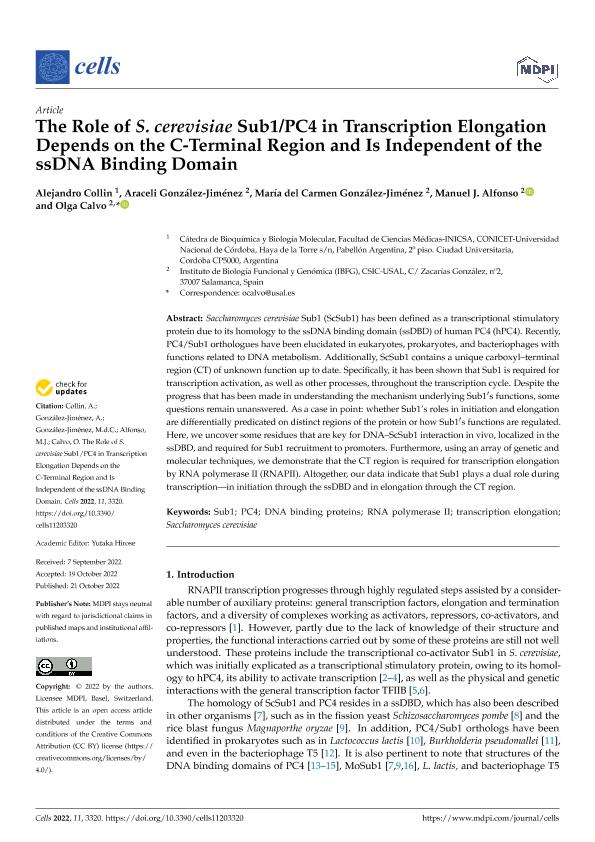Mostrar el registro sencillo del ítem
dc.contributor.author
Collin, Alejandro Alberto

dc.contributor.author
González Jiménez, Araceli
dc.contributor.author
González Jiménez, María Del Carmen
dc.contributor.author
Alfonso, Manuel J
dc.contributor.author
Calvo, Olga
dc.date.available
2023-07-04T11:11:28Z
dc.date.issued
2022-10
dc.identifier.citation
Collin, Alejandro Alberto; González Jiménez, Araceli; González Jiménez, María Del Carmen; Alfonso, Manuel J; Calvo, Olga; The Role of S. cerevisiae Sub1/PC4 in Transcription Elongation Depends on the C-Terminal Region and Is Independent of the ssDNA Binding Domain; MDPI; Cells; 11; 20; 10-2022; 1-20
dc.identifier.issn
2073-4409
dc.identifier.uri
http://hdl.handle.net/11336/202123
dc.description.abstract
Saccharomyces cerevisiae Sub1 (ScSub1) has been defined as a transcriptional stimulatory protein due to its homology to the ssDNA binding domain (ssDBD) of human PC4 (hPC4). Recently, PC4/Sub1 orthologues have been elucidated in eukaryotes, prokaryotes, and bacteriophages with functions related to DNA metabolism. Additionally, ScSub1 contains a unique carboxyl–terminal region (CT) of unknown function up to date. Specifically, it has been shown that Sub1 is required for transcription activation, as well as other processes, throughout the transcription cycle. Despite the progress that has been made in understanding the mechanism underlying Sub1′s functions, some questions remain unanswered. As a case in point: whether Sub1’s roles in initiation and elongation are differentially predicated on distinct regions of the protein or how Sub1′s functions are regulated. Here, we uncover some residues that are key for DNA–ScSub1 interaction in vivo, localized in the ssDBD, and required for Sub1 recruitment to promoters. Furthermore, using an array of genetic and molecular techniques, we demonstrate that the CT region is required for transcription elongation by RNA polymerase II (RNAPII). Altogether, our data indicate that Sub1 plays a dual role during transcription—in initiation through the ssDBD and in elongation through the CT region.
dc.format
application/pdf
dc.language.iso
eng
dc.publisher
MDPI

dc.rights
info:eu-repo/semantics/openAccess
dc.rights.uri
https://creativecommons.org/licenses/by/2.5/ar/
dc.subject
DNA BINDING PROTEINS
dc.subject
PC4
dc.subject
RNA POLYMERASE II
dc.subject
SACCHAROMYCES CEREVISIAE
dc.subject
SUB1
dc.subject
TRANSCRIPTION ELONGATION
dc.subject.classification
Bioquímica y Biología Molecular

dc.subject.classification
Ciencias Biológicas

dc.subject.classification
CIENCIAS NATURALES Y EXACTAS

dc.title
The Role of S. cerevisiae Sub1/PC4 in Transcription Elongation Depends on the C-Terminal Region and Is Independent of the ssDNA Binding Domain
dc.type
info:eu-repo/semantics/article
dc.type
info:ar-repo/semantics/artículo
dc.type
info:eu-repo/semantics/publishedVersion
dc.date.updated
2023-07-03T15:19:01Z
dc.identifier.eissn
2073-4409
dc.journal.volume
11
dc.journal.number
20
dc.journal.pagination
1-20
dc.journal.pais
Suiza

dc.journal.ciudad
Basilea
dc.description.fil
Fil: Collin, Alejandro Alberto. Universidad Nacional de Córdoba. Facultad de Medicina. Cátedra de Bioquímica y Biología Molecular; Argentina. Consejo Nacional de Investigaciones Científicas y Técnicas. Centro Científico Tecnológico Conicet - Córdoba. Instituto de Investigaciones en Ciencias de la Salud. Universidad Nacional de Córdoba. Instituto de Investigaciones en Ciencias de la Salud; Argentina
dc.description.fil
Fil: González Jiménez, Araceli. Universidad de Salamanca; España
dc.description.fil
Fil: González Jiménez, María Del Carmen. Universidad de Salamanca; España
dc.description.fil
Fil: Alfonso, Manuel J. Universidad de Salamanca; España
dc.description.fil
Fil: Calvo, Olga. Universidad de Salamanca; España
dc.journal.title
Cells

dc.relation.alternativeid
info:eu-repo/semantics/altIdentifier/url/https://www.mdpi.com/2073-4409/11/20/3320
dc.relation.alternativeid
info:eu-repo/semantics/altIdentifier/doi/http://dx.doi.org/10.3390/cells11203320
Archivos asociados
